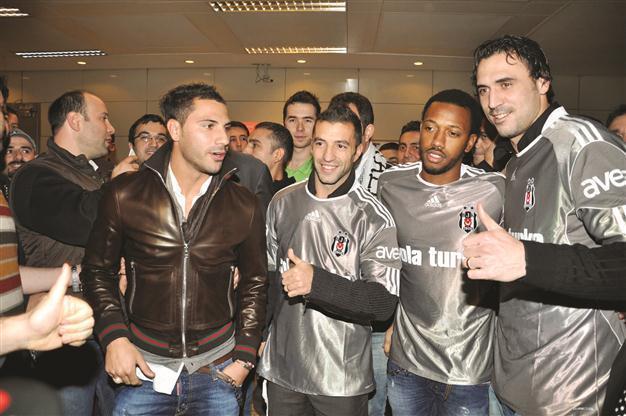Turkey needs to tackle backroom transfer deals
ISTANBUL- Hürriyet Daily News

This file photo from January shows Beşiktaş superstar Ricardo Quaresma (L) welcome his compatriots Simao Sabrosa, Manuel Fernandes and Hugo Almeida upon their arrivals in Istanbul. Beşiktaş has signed several Portuguese players in the last year, which was a result of chairman Yıldırım Demirören’s partnership with agent Mendes. DHA photo
The opaque world of player transfers in Turkish football should be more transparent as purchasing players through hedge funds becomes more and more common, according to economic analysts.
“As football has become an industry, it was inevitable that it would have its roots in other branches,” football economist Tuğrul Akşar told the Hürriyet Daily News. “Third-party ownership is one of them. This is a new sector making hundreds of millions of dollars buying and selling players.”
World football has begun to sanction and limit obscure transfers. For example, the English Premier League banned third-party ownership of players after it complicated striker Carlos Tevez’s move to Manchester United in 2008. As another example, the head of Portugal’s stock market regulator suspended trading in Benfica shares in August until the club disclosed more information about a player’s $11 million transfer deal, according to a Bloomberg report.
Furthermore, the biggest step to tackle the ambiguity in transfers was the introduction of the Transfer-Matching System (TMS), an online scheme which became mandatory between international player moves as of Oct. 1, 2010. Working on the TMS, FIFA easily monitors whether a club’s transfer expenses are balanced with their earnings.
“Thanks to TMS, football’s authorities have more details available on each and every transfer,” FIFA President Jospeh S. Blatter said. “It increases the transparency of individual transactions and helps us to tackle issues such as the fight against money laundering and the protection of minors in transfers.”
However, Turkey has done very little in fighting ambiguity in transfers. Turkey’s most active team in the transfer window recently, Beşiktaş signed midfielder Julio Alves from Atletico Madrid, only two days after the Spanish club purchased him.
Beşiktaş bought 50 percent of the player’s rights for 3.1 million euros and it is not clear who owns the other half, Bloomberg reports.
Alves was not the only player Beşiktaş bought through third parties. In the last two years, Beşiktaş signed several Portuguese players – including Ricardo Quaresma, Simao Sabrosa, Hugo Almeida and Manuel Fernandes – who were all represented by Jorge Mendes.
The Portuguese player agent was reportedly one of the investors in the fund that made those transfers possible. Mendes’ inextricable ties with club Chairman Yıldırım Demirören were seen when the Quality Football Ireland company, believed to have ties with the Portuguese agent, acquired half of the future transfer rights of Beşiktaş’s three young players, including 16-year-old Muhammed Demirci, dubbed the hottest prospect of the country.
“You see in Beşiktaş’s case: Demirören is purchasing players through his own company and making the club indebted to that company,” economist Mert Yıldız of Renaissance Capital said.
Akşar said third-party ownership has many downsides to it.
“If you are talking about hedge funds, you cannot talk about transparency,” Akşar said. “It can open the doors for money from shadow sectors to enter the football world.
Mustafa Telçeker, a Turkish Football Federation (TFF) official from the Professional Footballer Registration Department, said the governing body has no sanctions on the hedge funds. “We don’t know if a player is purchased through a hedge fund or another company,” Telçeker told the Daily News. “We are solely interested in, for example, Beşiktaş’s contract with Hugo Almeida. We don’t have a rule or limitation on hedge funds.”
Stricter regulations are a must.
“I see hedge funds as football’s Achilles heel. Its accounts are in the dark,” Akşar said. “It is not possible to avoid them as a whole, but they should be kept under control.”
